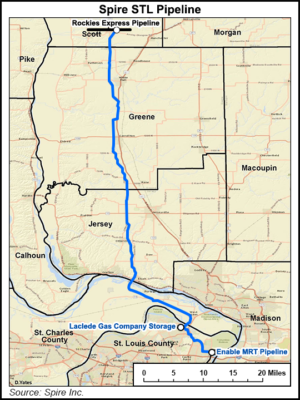A land company representing Greene County landowners recently had their allegations of impropriety against a pipeline company.
The Federal Energy Regulatory Commission dismissed the July 3, 2019 filing by Central Land Consulting LLC against the Spire Pipeline. Central Land represents 33 landowners along the easement of the pipeline’s trek from the St. Louis Metro Area to southern Scott County. The filing contended that, among other things, that Spire and FERC had failed to properly consider the landowners’ environmental noncompliance allegations by Spire.
Landowners along the easement have claimed that Spire had failed to restore the land to its almost original condition, failed to restore county roads, and had destroyed topsoil on farming ground throughout the easement. WLDS reported about the Spire Pipeline’s destruction of the hunting ground of Kenny Davis on the Greene-Scott County line near Alsey. The total damage that Central Land says that Spire is responsible for amounts to over $20.5 million.
In the ruling on Tuesday, FERC called Central Land’s filing an impermissible collateral attack on Spire because they lack the standing to bring the complaints. FERC says that because none of the 33 individuals sought rehearings on original complaints filed in 2018 in the Spire matter, that they fall outside the statute of limitations. The general limitation is 30 days.
In a concurring statement with FERC, new Biden-appointed Commissioner Richard Glick and Commissioner Allison Clements that it is not the end of the road for landowners to file their own complaints about the easement issue. Glick and Clements write: “[The] determinations [in the decision] do not preclude landowners from continuing to pursue their claims before the Commission based on additional arguments or evidence that they may choose to introduce.” They go on to say that the commission does have serious concerns about the restoration of lands and will “retain an open mind” when hearing any future arguments on the matter. Glick and Clements also say that they are troubled by the antiquated rules that lie in front of landowners when they seek to bring grievances before FERC, and hope to clear up the issues for more clear cut ways of redress for grievances within the next few months.
However, they feel under FERC’s rules for the hearing Tuesday were held correctly and they decided to concur with them. The commissioners go on to say that “the fact that we have to make [the determinations] at all is a reminder that the Commission must redouble its efforts to ensure that our proceedings adequately accommodate landowners and other entities that lack the same means as pipeline developers to hire expert representation.” FERC hopes to create a more robust Office of Public Participation in the coming months to fix the issue.




